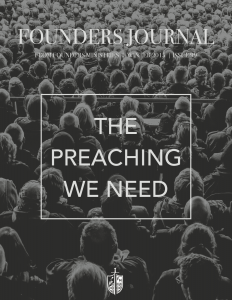I had a conversation with a minister friend who had been involved in discussing what pastors were preaching in their churches. While most seemed to agree that exposition of the biblical text must have priority in the church, few thought it wise to preach consecutively through books of the Bible—particularly with series that extended beyond twelve weeks. I understand the challenge of longer series but also see the value in the long run. The forty-four sermons that I preached through Ephesians in 1990–91, literally transformed my life, theology, and congregation. Eight or ten sermons would not have sufficed to uproot faulty theology and set us on a right course. The fifty-two sermons in Hebrews in 2000–01, sharpened our understanding of the gospel and its application to the whole of life.
What would you say had you been involved in the discussion? Here are a few thoughts that I’ve ruminated on since that conversation:
(1) Pastors have the responsibility to preach the whole range of biblical revelation. Paul told the Ephesian elders, “For I did not shrink from declaring to you the whole purpose of God” (Acts 20:27). He could not simply address his favorite issues but intentionally sought to address the issues of God’s will for sinners and for the redeemed. Do we address the range of God’s will for the Galatians or to those who first received First and Second Samuel, by picking one or two texts to expound to the neglect of the others?
(2) Preaching consecutively through a book allows the pastor and congregation the opportunity to better absorb the purpose of God and the impact upon the original audience. I recently completed preaching fifty sermons through Genesis (Jim Boice did 180!). What amazed me as I studied and preached was how the biblical narrative presented several points of crescendo that we would have missed had I only picked selected texts. For instance, Abraham offering Isaac at God’s command is certainly one of the most magnificent Old Testament scenes that gave assurance to God’s purpose for His people, as well as pointing to Christ as our substitute. But if we simply preach Genesis 22 without having walked through that long journey from Genesis 12, where God called Abraham out of paganism and then faithfully preserved him through many ups and downs as he waited for the unfolding of God’s promise of a son, then we miss something of the pathos intended for the original audience. Can you imagine those first hearers of Genesis listening to the build up of the story—hearing the promises of God that depended upon the solitary heir of the patriarch—gasping at the seemingly out-of-the-blue command of God to sacrifice his “only son”? The knife raised above the very one that held the key to all that God had promised in the previous ten chapters. Then God provided a substitute—and in so doing preserved the line of Abraham that eventually came to the grand fruition of blessing to the nations in the person of Jesus Christ. Yes, we can just preach Genesis 22, and it will be powerful, but I suggest that it loses something of its effect when we skip over living together each week in the previous ten chapters.
(3) Preaching consecutively through books of the Bible gives the pastor and congregation a better understanding of a particular book, and if properly expounded, a fuller grasp of biblical theology. I can preach Ephesians 2:8–10, and exhort my hearers to depend upon the grace of God in Christ alone. But if I’ve taken my congregation to the mountain top in chapter one, descended to the darkest depths in the opening of chapter two, and then listened to Paul’s declaration, “But God,” in Ephesians 2:4, then I find the familiar 2:8–10 to come with greater weight to my hearers. As Martyn Lloyd-Jones pointed out, until we’ve dealt with the doctrines of the text we’ve not really dealt with the text. Short series that skip over the broader doctrinal context may shorten the preaching but also weakens the doctrinal impact.
(4) Preaching consecutively through books of the Bible focuses the pastor onto the biblical storyline lest he skip those uncomfortable texts he otherwise would never preach. In my Genesis expositions, I wrestled through Noah’s drunkenness, Lot’s incestuous acts, and Judah’s adultery with his daughter-in-law. I would not voluntarily pick those texts for topical expositions! But they are part of the storyline of Scripture that helps us to understand the fallen condition and the necessity of God’s grace to redeem sinners. Those texts helped my congregation to better grasp the message of Genesis hammering home that the living God preserves His people despite their messy lives.
(5) Preaching consecutively through books of the Bible gives congregations a chance to meditate more deeply upon a particular book, mining its riches, soaking up its doctrines, and making pointed applications to daily life. For instance, if you work through a book, you are regularly considering the context of that book until it begins to stick into the minds of the congregation (not to mention your own mind!). That way, as they read and think upon passages in that book, the understanding of context informs their interpretation. As a bonus, they are actually learning hermeneutics as the pastor works through the book! Their meditation upon the text, consequently, will be done contextually, by which richer understanding of doctrine and application will be developed. One can microwave a beef roast and serve it to guests (short series through books), but the slow roasting in the oven (full book exposition) will soak up the flavors, tenderize the meat, and make for a more satisfying meal.
So, am I suggesting that we all preach thirteen years through Romans, as did Martyn Lloyd-Jones (without finishing it)? Or preach 40+ years through Job, as did the Puritan Joseph Caryl? Not at all! Rather let’s think of a measured way to work adequately through a book of the Bible, giving us time as preachers to absorb it, and giving our congregations a chance to grapple with its message. The preacher has to decide what he can handle and what the congregation can listen to—that will vary from one congregation to another. Admittedly, many congregations are not ready to spend a year or two in Genesis or Romans or John. The pastor may not quite be ready either. That takes training for pastor and congregation through starting with smaller books and working toward longer ones, all the while teaching the congregation how to read, listen to, meditate upon, and interpret the Word. But in the end, as pastor and congregation grow together in expounding and hearing God’s Word, a depth and satisfaction with God’s Word will certainly take place. I cannot imagine any pastor preaching through books of the Bible, and then looking back and saying, “I wished that I had not spent so much time preaching through books of the Bible to the people for whom I will give an account to God.”






















